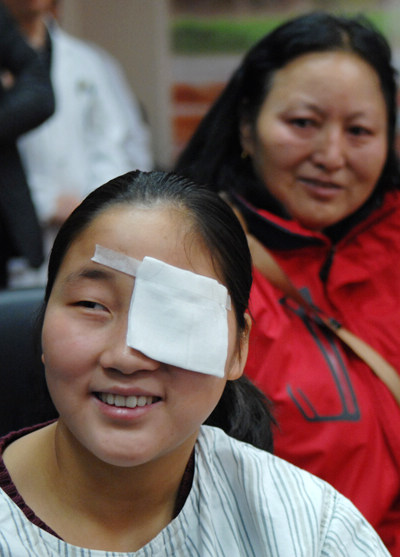|
 |
|
SEE AGAIN: Liu Jing, a recipient of a cornea transplant in the No.1 Hospital Affiliated to Xi'an Jiaotong University on December 17, 2011 (LI YIBO) |
The ring is accused of deceiving scores of young and poor people to sell kidneys by paying them approximately 25,000 yuan ($3,970) each. The kidneys were then sold to transplant patients for about 200,000 yuan ($31,750) each. Those involved in the scam include doctors from public hospitals.
In 2007, the State Council, China's cabinet, promulgated the Regulation on Human Organ Transplantation, the first national regulation in this field. It explicitly bans the sale of organs and limits recipients of organs donated by living donors to the donor's spouse, lineal relatives by blood, collateral relatives within the third degree of kinship and people who have developed family-like relationship with donors by aiding them. The regulation also requires any transplant surgeries to be conducted in medical institutions with qualified staff, sufficient equipment, a clinical and medical ethics committee and a registration at the provincial-level health authorities. In the ethics committee, transplant surgeons should not constitute more than a quarter of the total membership.
The regulation also requires every case of organ harvesting from cadavers to be reviewed by the ethics committee in order to rule out the possibility of organ sales. An application for a transfer can only be ratified if more than two thirds of committee members give their approval.
Shen at Tsinghua University, who is participating in the revision of the regulation, told Beijing Review that in light of the revised draft, organs donated by living persons can no longer be used by people who are emotionally related to donors through aid since the clause has been abused to facilitate organ sales. He said that another major change is to clearly identify the responsibilities and duties of Red Cross organizations in promoting organ donation.
According to the Red Cross Society of China, under a pilot program in 16 provincial-level regions across the country, 207 deceased donors donated 546 life-saving organs and 15,379 people registered as organ donors in the past two years.
Hao Linna, Vice President of the Red Cross Society of China, who led the two-year pilot program, said that proposed additions to the organ donation regulation include "Red Cross organizations around the country shall participate in awareness campaigns for organ donation, donor registration, organ allocation, remembrance of organ donors and distributing humanitarian benefits to their surviving families," and "the country encourages citizens to donate their organs after death."
"Encouraging public donations and widening the available legal sources of organs is the only solution to the transplant organs shortage in China," Hao said.
But promoting organ donation is a very complicated process, requiring clear guidelines on procedures for determining death, harvesting organs and allocating organs. Hao said that only by establishing an independent national-level institution can the work of drafting organ donor laws and regulations, collecting suggestions from various professionals and training personnel in this field be effectively conducted.
Zhao Baige, Executive Vice President of the Red Cross Society of China, said that the efforts to promote deceased organ donation demand coordinated efforts and support from different government departments. "Cross-department coordination is badly needed when donors are traffic accident victims or die in a place other than their permanent residences," she said.
Also badly needed are laws and regulations defining the compensation standards for the families of deceased organ donors. Under the two-year pilot program, relatives of 90 percent of the 207 deceased donors successfully applied for subsistence benefits, spurring public worries that monetary rewards could become disguised forms of payment for donated organs.
"Organ donation is a fair cause and we are totally against the routine where the poor sell organs for money and the rich simply benefit," Huang said.
However, Hao said that it is an international norm to provide donors' families with financial aid, which was distinct from organ trading.
| 